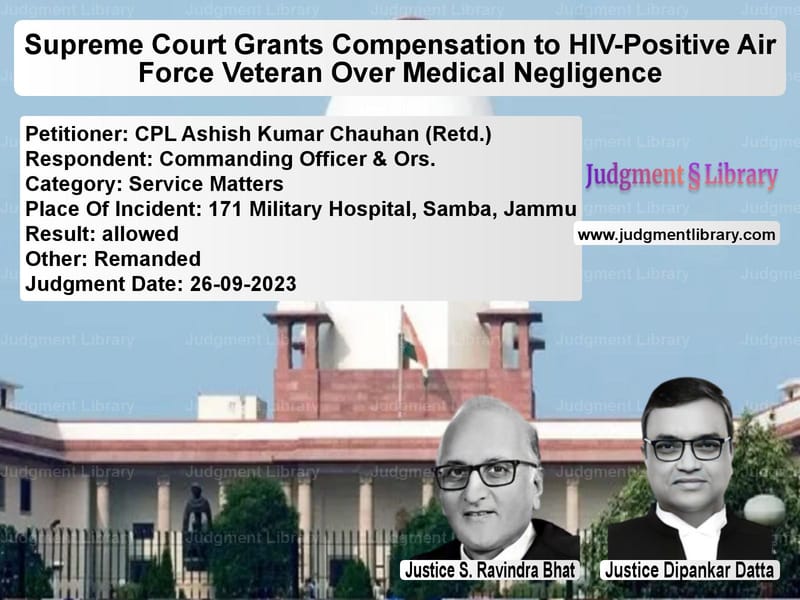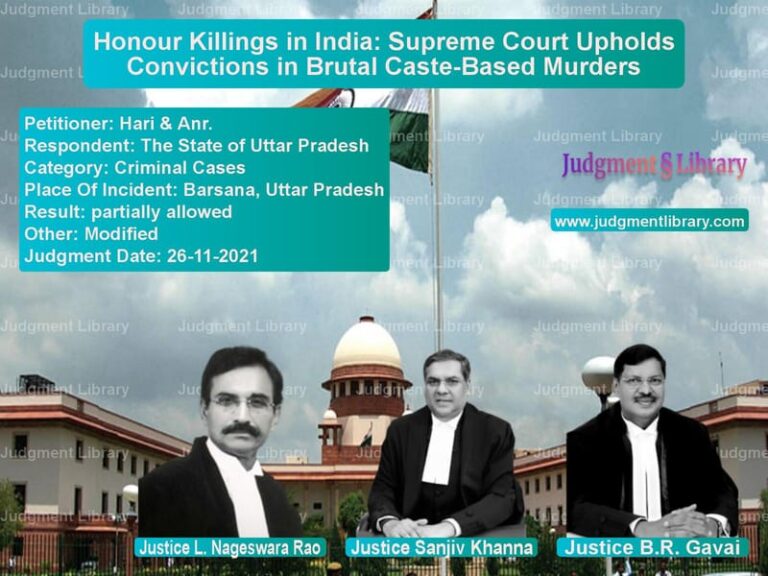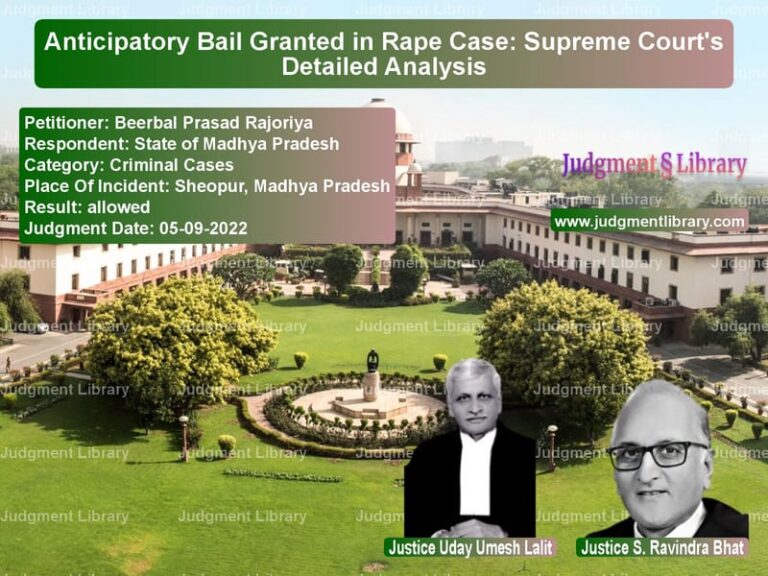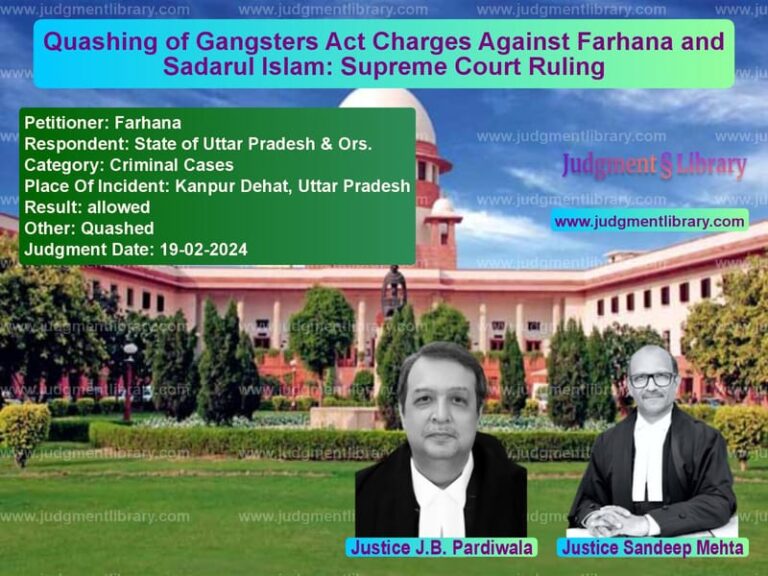Supreme Court Grants Compensation to HIV-Positive Air Force Veteran Over Medical Negligence
The Supreme Court of India has delivered a landmark judgment in the case of CPL Ashish Kumar Chauhan (Retd.) vs. Commanding Officer & Ors., where the Court found medical negligence in the transfusion of HIV-contaminated blood to the appellant at a military hospital. The Court ordered a compensation of ₹1.54 crore to the appellant and directed systemic changes in the treatment and protection of HIV-positive individuals.
Background of the Case
The appellant, CPL Ashish Kumar Chauhan, was serving as a radar operative/technician in the Indian Air Force (IAF) during Operation Parakram in 2002. Due to health complications, he was admitted to the 171 Military Hospital (171 MH) in Samba, Jammu, where he was transfused with one unit of blood. The hospital lacked a licensed blood bank, and the transfusion was conducted under an ‘ad-hoc’ arrangement, with blood sourced from another military facility, 166 Military Hospital (166 MH).
For over a decade, the appellant remained asymptomatic. In 2014, he was diagnosed with HIV during treatment at INHS Asvini, Mumbai. He traced the likely source of infection to the 2002 transfusion and requested medical records, which the authorities denied on the grounds that they had been destroyed as per policy.
Petitioner’s Arguments
The appellant, represented by amici curiae Ms. Meenakshi Arora and Ms. Vanshaja Shukla, argued:
- The transfusion at 171 MH was conducted without proper screening for HIV and other bloodborne infections.
- No written informed consent was obtained before the transfusion, violating medical protocols and legal requirements.
- The Indian Army and IAF obstructed access to medical records, violating the Right to Information (RTI) Act.
- The subsequent Court of Inquiry (CoI) in 2018, which exonerated military doctors, was conducted without his participation, violating principles of natural justice.
- The 2014 HIV-negative report produced by the respondents was unreliable, lacking essential details like lab reference numbers and author signatures.
- The military’s own Medical Board had certified that his disability was attributable to service, entitling him to compensation.
Respondents’ Arguments
The Indian Army and IAF, represented by Additional Solicitor General Mr. Vikramjit Banerjee, contended:
- The appellant had no conclusive proof that the 2002 transfusion caused his HIV infection.
- The 171 MH facility followed standard procedures for blood screening.
- Blood test results in 2014 initially showed the appellant as HIV-negative.
- Medical negligence was not proven, as the appellant failed to provide expert testimony.
- The appellant’s HIV infection could have been caused by other means.
- The military was not obligated to retain medical records beyond three years under Indian Medical Council regulations.
Supreme Court’s Findings
The Supreme Court bench, comprising Justices S. Ravindra Bhat and Dipankar Datta, held that the case met the legal standard of res ipsa loquitur (the thing speaks for itself), establishing medical negligence. The Court made several crucial observations:
1. Failure of Duty of Care
The Court found that 171 MH did not have a licensed blood bank, and the transfusion was carried out under an ad-hoc arrangement. The absence of proper medical oversight, including the lack of a transfusion expert, pointed to a systemic failure in ensuring patient safety.
2. Breach of Informed Consent
The respondents failed to provide any signed informed consent from the appellant before the transfusion. The Court noted:
“A patient must be provided with adequate information about the necessity of blood transfusion, available alternatives, and the potential risks associated with both transfusion and non-transfusion options to make an informed decision.”
3. Suppression of Evidence
The Court criticized the military authorities for withholding medical records, stating:
“The appellant was repeatedly stonewalled in his attempts to access critical medical records, which points to an attempt to evade accountability.”
4. Court of Inquiry Was Biased
The Court noted that the 2018 CoI, which absolved the medical officers of negligence, was conducted without notifying the appellant or allowing him to present his case. This was a clear violation of natural justice.
5. HIV Can Remain Asymptomatic for Years
The Court referred to guidelines from the National AIDS Control Organisation (NACO) and the World Health Organization (WHO), which recognize that HIV can remain latent for over a decade. This supported the appellant’s claim that the 2002 transfusion was the probable source of his infection.
Compensation Awarded
The Supreme Court awarded the appellant a total compensation of ₹1,54,73,000, divided as follows:
- ₹86,73,000 for loss of earnings, considering his premature retirement and loss of future income.
- ₹50,00,000 for mental agony and harassment caused by medical negligence and denial of justice.
- ₹18,00,000 for future medical care, including the cost of hiring a caretaker.
Systemic Reforms Ordered
The Court also issued significant directives to improve healthcare and legal protections for HIV-positive individuals:
- Government hospitals must strictly follow NACO guidelines for blood screening and transfusions.
- The Centre and States must ensure free and comprehensive healthcare for all HIV-positive individuals.
- The armed forces must guarantee continued medical treatment for the appellant at military healthcare facilities.
- All public and private sector employers must comply with the HIV and AIDS (Prevention and Control) Act, 2017 to prevent discrimination.
Conclusion
The Supreme Court’s ruling in CPL Ashish Kumar Chauhan vs. Commanding Officer & Ors. is a significant step in ensuring accountability in medical negligence cases. It underscores the rights of military personnel to proper healthcare and fair treatment and sets a strong precedent for holding medical institutions accountable for lapses in duty of care.
This judgment reaffirms that negligence in medical treatment, especially in high-risk procedures like blood transfusions, can have life-altering consequences. By granting compensation and directing systemic reforms, the Court has ensured that justice is served not only for the appellant but also for future patients in similar situations.
Petitioner Name: CPL Ashish Kumar Chauhan (Retd.).Respondent Name: Commanding Officer & Ors..Judgment By: Justice S. Ravindra Bhat, Justice Dipankar Datta.Place Of Incident: 171 Military Hospital, Samba, Jammu.Judgment Date: 26-09-2023.
Don’t miss out on the full details! Download the complete judgment in PDF format below and gain valuable insights instantly!
Download Judgment: cpl-ashish-kumar-cha-vs-commanding-officer-&-supreme-court-of-india-judgment-dated-26-09-2023.pdf
Directly Download Judgment: Directly download this Judgment
See all petitions in Medical Malpractice
See all petitions in Public Sector Employees
See all petitions in Workplace Harassment
See all petitions in Judgment by S Ravindra Bhat
See all petitions in Judgment by Dipankar Datta
See all petitions in allowed
See all petitions in Remanded
See all petitions in supreme court of India judgments September 2023
See all petitions in 2023 judgments
See all posts in Service Matters Category
See all allowed petitions in Service Matters Category
See all Dismissed petitions in Service Matters Category
See all partially allowed petitions in Service Matters Category







